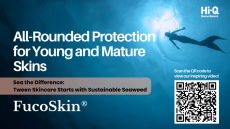Greenpeace calls for microplastic ban and clear labelling

Following a crowdsourcing investigation, Greenpeace East Asia, based in Hong Kong, has found that five leading cosmetics retailers are selling products with microplastics.
The small plastic particles, known as microplastics, have increasingly been found to have damaging effects on the environment and have failed to provide clear ingredient labelling on their products.
Microplastics are not only found in common cosmetics and beauty products including facial cleansers and scrubs but everyday products too, emphasised Kate Lin, who is a Senior Campaigner for Greenpeace.
The investigation surveyed approximately 1,500 products from Bonjour, Colourmix, Mannings, Sasa and Watsons product ranges.
The environmental organisation investigated a variety of products in the cosmetics and beauty sectors including rinse-off products such as face cleansing products, body cleansing products and hair cleansing products, along with leave-on products such as Face cosmetics, eye cosmetics, lip cosmetics, sunscreen and others.
Microplastic consequences
Nearly 50% of these products were found to contain insufficient and unclear ingredient labelling. Of the products that did have clear labelling, almost 40% contained microplastics.
“This crowdsourcing research discovered that a lot of makeup products such as eyeshadow, foundation, and lipstick also contain microplastics. These microplastics are smaller and more difficult to remove, and thus pose a greater pollution threat to our oceans,” said Kate Lin, Senior Campaigner, Greenpeace.
“What’s even more concerning is that the vast majority of brands and retailers do not properly monitor microplastics in their leave-on products nor do they have any plan to phase them out.”
“Since half of their products are not clearly labelled, it's very easy for the customer to mistakenly buy a product with microplastics,” said Lin. “A conscientious retailer must not only ensure that the products they are selling do not contain microplastics but also provide more product information to give consumers peace of mind when they shop at their stores.”
Medical research has shown that materials smaller than 100 nanometres can be absorbed by skin cells, leading to a more direct threat to the human body.
A number of global brands have agreed to phase out the use of microplastics in their products. In fact, the US introduced legislation in 2015 banning microplastics in cosmetics and personal care products.
Following suit, Taiwan and South Korea have also announced their plans to introduce similar laws. This is not being seen across the entire APAC region, however, as Hong Kong has no similar law or policy.
Greenpeace’s message
Greenpeace East Asia is now urging retailers in Hong Kong to stop all sales of microplastics in their stores and the use of microplastics in their branded products, along with ceasing to stock other brands that contain microplastics.
Transparent information should be provided so consumers are aware of all ingredients contained in cosmetics and beauty products.
The Hong Kong government should urgently enact legislation to ban the use of microplastics in cosmetics and personal care products, as well as amending the law to force companies to clearly label all their products so the public can make an informed choice.
Following the investigation ,the five cosmetics brands have now decided to tackle the issues of microplastic use and sufficient labelling to ensure consumers are aware and able to make informed purchasing decisions.
Retailers: What now?
While there is no public information available for multi-product retailer, Colourmix, all four other brands are taking steps to reduce and/or remove microplastics from their product ranges:
- Bonjour - All private brands products will stop containing microplastics from 30 June 2017. Although this does include non-private brands products, it does not indicate a clear timeline. It does not, however, include leave-on products.
- Mannings - All private brands products will stop containing microplastics from 1 March 2017. However, this decision does not include non-private brands products, does not include leave-on products and is applicable in the Hong Kong market only.
- Sasa - All private and non-private brands products will stop containing microplastics by 31 December 2018. It does not include leave-on products.
- Watsons - All private brands products will stop containing microplastics from 1 September 2016 for the Hong Kong market and from 1st January 2017 for other markets. It does not include non-private brands products or leave-on products


















